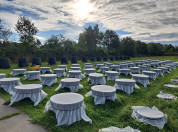Droevendaalsesteeg 10
6708 PB Wageningen
The Netherlands
With my PhD project, I aim to contribute to a better understanding of the micro-evolutionary adaptation potential of organisms to human-induced stressors in their environment, and the resulting effects on ecosystem functioning.
During my studies Biology (BSc and MSc) and Forest and Nature Conservation (MSc) at Wageningen University, I became particularly interested in ecosystem functioning, species-environment interactions and the potential of organisms to adapt to changing environmental conditions. Besides, I became highly interested in nature-inclusive development and nature-based solutions.
In my first thesis I studied early vegetation development on a sandy foreshore in front of the Houtribdijk (between the Markermeer and IJsselmeer), as a nature-based flood defence. Through a field and greenhouse experiment, I compared native and non-native vegetation, showing that the native vegetation may offer better long-term performance and greater drought resistance.
During my internship at Rijkswaterstaat, I investigated nature-inclusive developments for infrastructure. Results showed that even a highway has potential to not only harm nature, but also contribute to nature development.
My second thesis, combined with an internship at Witteveen+Bos, focussed on the potential of eDNA as tool for freshwater quality assessment and analysis. Shown linkages between biological taxa and physical-chemical data revealed eDNA indicators for water quality, supporting the idea that eDNA profiles can reflect water quality.
PhD project
Evolutionary processes can be so rapid that they affect ecological processes, and vice versa. Those reciprocal interactions between ecology and evolution are called eco-evolutionary dynamics. My PhD research at the Aquatic Ecology department of NIOO, in the research group of Steven Declerck, is in the field of eco-evolutionary dynamics.
We are investigating to what extent aquatic organisms are able to rapidly adapt to (anthropogenic) stressors in their environment, through micro-evolutionary adaptation. Since populations of species may differ in their ability to adapt to stressors and they might affect each other’s evolutionary trajectories, it is important to acknowledge the role of the community context in evolutionary adaptation. In my research, I am investigating to what extent micro-evolutionary adaptation of organisms is affected by the community context (eco-to-evo), and vice versa, how micro-evolutionary adaptation influences community composition and ecosystem functioning (evo-to-eco).
The model species of my research are water fleas and I am investigating to what extent they are able to rapidly adapt to salinization, an increasingly important stress factor on freshwater ecosystems. Aim is to increase insight in the adaptation potential of water fleas to salinization, the role of the community context in this adaptation, and how this affects important aquatic ecosystem functions. More broadly, I hope to contribute to the understanding of the role of rapid evolutionary adaption in enabling organisms to deal with anthropogenic stressors and climate change, and the effects of this on ecosystem functioning.
